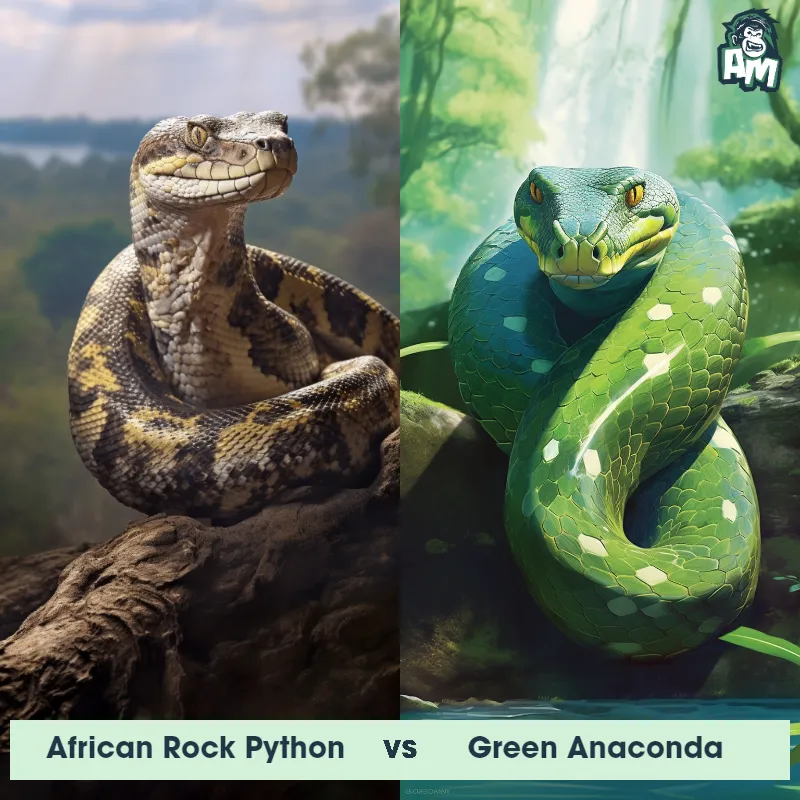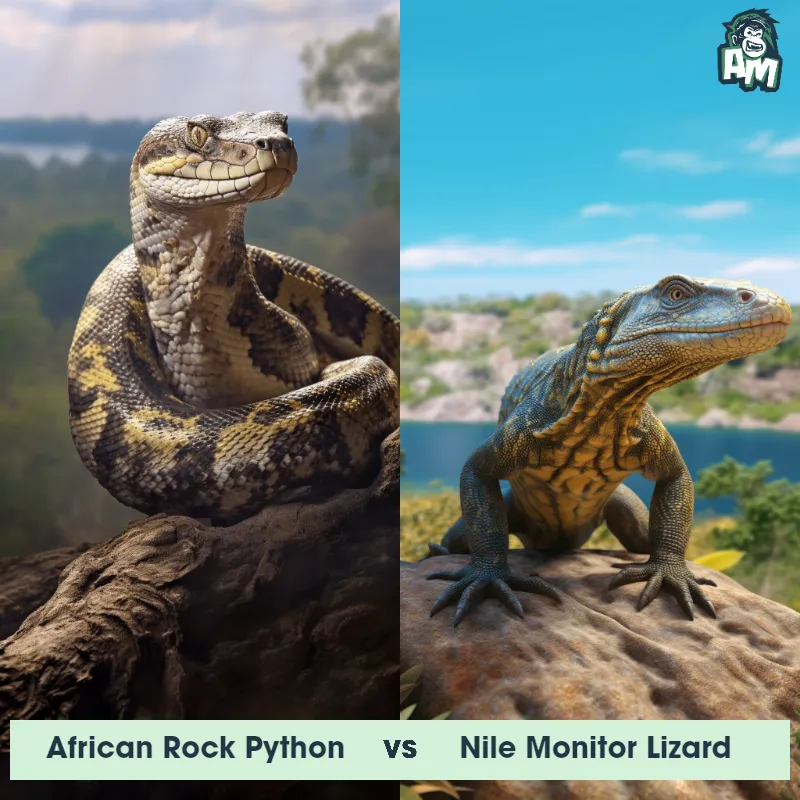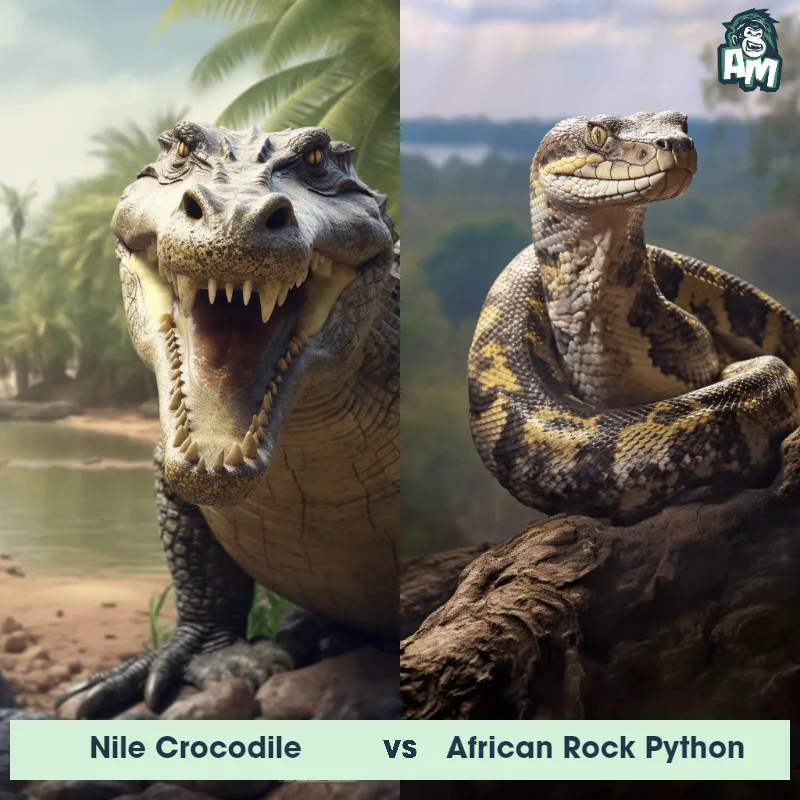The African Rock Python
The African Rock Python, scientifically known as Python sebae, is one of the largest snake species in Africa. With an average length of 12-18 feet, but capable of reaching up to 20 feet, this non-venomous constrictor is known for its robust build and highly adaptable nature. Its coloration varies from light brown to dull gold, with dark brown blotches outlined by white or yellowish scales covering its entire body. African Rock Pythons have heat-sensing pits on their lips, allowing them to detect prey even in total darkness. They possess a keen sense of smell and rely on their powerful muscles to constrict their prey before swallowing it whole.

| African Rock Python | |
|---|---|
| Size | Up to 20 feet (6.1 meters) |
| Weight | Up to 200 pounds (91 kilograms) |
| Speed | Speed: 5 mph (8 km/hr) |
| Key Strength | Constriction |
| Biggest Weakness | Vulnerable to attacks on the head |
| Scientific Name | Python sebae |
| Family | Pythonidae |
| Habitat | Terrestrial |
| Geography | Sub-Saharan Africa |
| Diet | Wide variety of prey, including antelopes, crocodiles, and porcupines |
| Lifespan | 12 - 30 |

The African Rock Python
The African Rock Python, scientifically known as Python sebae, is one of the largest snake species in Africa. With an average length of 12-18 feet, but capable of reaching up to 20 feet, this non-venomous constrictor is known for its robust build and highly adaptable nature. Its coloration varies from light brown to dull gold, with dark brown blotches outlined by white or yellowish scales covering its entire body. African Rock Pythons have heat-sensing pits on their lips, allowing them to detect prey even in total darkness. They possess a keen sense of smell and rely on their powerful muscles to constrict their prey before swallowing it whole.
Fun Fact: The African Rock Python is highly skilled in ambush hunting and can strike with incredible speed and precision using its long, sharp teeth to deliver a fatal bite.
| African Rock Python | |
|---|---|
| Size | Up to 20 feet (6.1 meters) |
| Weight | Up to 200 pounds (91 kilograms) |
| Speed | Speed: 5 mph (8 km/hr) |
| Key Strength | Constriction |
| Biggest Weakness | Vulnerable to attacks on the head |
| Scientific Name | Python sebae |
| Family | Pythonidae |
| Habitat | Terrestrial |
| Geography | Sub-Saharan Africa |
| Diet | Wide variety of prey, including antelopes, crocodiles, and porcupines |
| Lifespan | 12 - 30 |
African Rock Python Matchups
We use AI to simulate matchups between the African Rock Python and other animals. Our simulation considers size, strength, and natural predatory behaviors to determine the most likely outcome.
African Rock Python: Diet, Predators, Aggression, and Defensive Behaviors
What do African Rock Pythons eat?
African Rock Pythons are opportunistic predators that primarily feed on a variety of mammals, including antelope, monkeys, rodents, and sometimes even larger prey such as warthogs and crocodiles. They are also known to consume birds, amphibians, and occasionally fish.
Do African Rock Pythons have any predators?
As adults, African Rock Pythons do not have many natural predators due to their large size and strength. However, young pythons may fall prey to birds of prey, large mammals, and other predators such as monitor lizards.
Are African Rock Pythons aggressive?
African Rock Pythons are known to be aggressive when provoked or threatened. They have a reputation for defending themselves by striking or constricting their prey or perceived threats. However, they will usually try to avoid confrontation if possible.
Do African Rock Pythons fight each other?
African Rock Pythons may engage in combat with each other during the mating season when competing for a mate. This ritualized "combat dance" involves intertwining their bodies and trying to wrestle the opponent into submission without causing serious harm.
How do African Rock Pythons defend themselves?
African Rock Pythons have several defense mechanisms to protect themselves from predators or threats. They can bite, constrict, and release musk as a deterrent. When feeling threatened, they may also inflate their bodies, hiss loudly, and adopt a defensive posture to make themselves appear larger and more intimidating.
What is the biggest weakness of African Rock Pythons in a fight?
Despite their impressive size and strength, African Rock Pythons have a relatively slow metabolism compared to other snake species. This means that they may become exhausted more quickly in a prolonged struggle, making them vulnerable to attack or escape by their opponent.
Fun Fact: African Rock Pythons are known for their incredible strength, as they have the ability to suffocate and consume prey much larger than themselves, including antelopes, warthogs, and even crocodiles.
Fun Fact: Unlike most snakes, the African Rock Python is an excellent swimmer, using its muscular body to efficiently navigate through water, allowing it to hunt for prey in rivers, swamps, and other aquatic habitats.
















